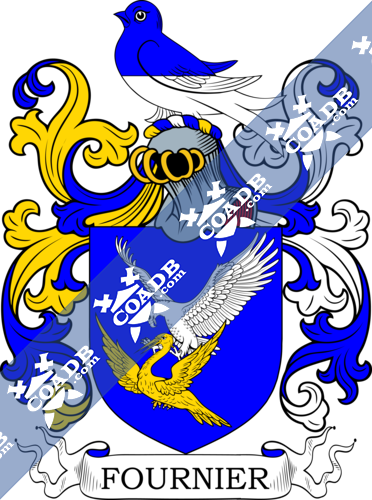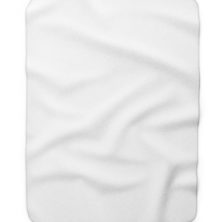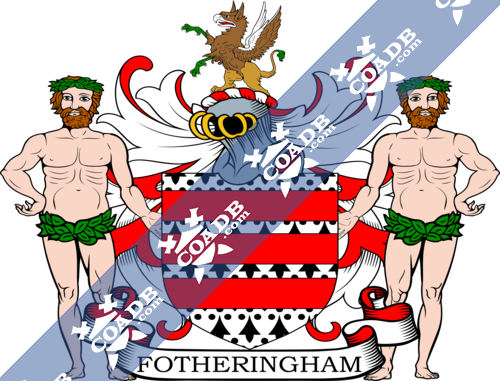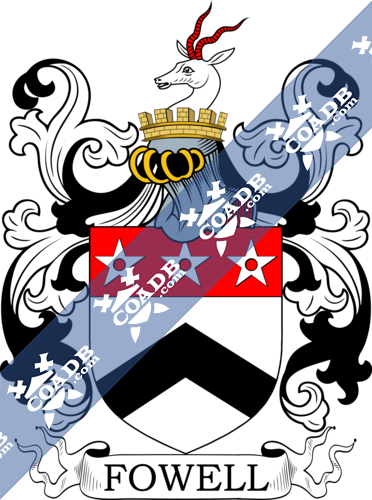Fournier Family Crest, Coat of Arms and Name History

Fournier Coat of Arms Gallery
Don’t know which Coat of Arms is yours?
We can do a genealogical research. Find out the exact history of your family!
Learn MoreFOURNIER
French in origin, the surname Fournier which was derived from the Latin “furnarius” translates to mean “baker” in English, therefore the name is occupational. The Americanized version of the name is Fuller. In its earliest incarnation the surname would have referred to someone who tended the oven (fourneau) fires in the kitchen of a castle, manor home, or the likes. As such, the person assigned this duty would usually be responsible for the baking of bread as well. During the progression of time, fewer and fewer households made their own bread, thus making the skills of a baker a valued commodity leading some bakers to open their own shops to meet the demand for bread and baked goods. Few occupations which have been put to use as a surname have retained their popularity throughout the ages.
In Europe the practice of using surnames was most commonly attributed to the French aristocracy. However, it was not until the middle ages that the practice took hold for the general population. Up until that era, the only people who engaged in the practice were the nobility but as communities grew and immigration became more prevalent the adoption of the practice of using surnames by the general population served several practical purposes. It gave governments a reliable way to track people for tax and census purposes and it made distinguishing one person from another easier. Those not of the noble class would often be identified by their given name plus their occupation while others may have been identified by their given name and one of their parent’s names. Others may have used surnames which derived from a defining physical trait or a familiar geographical location, a topographical landmark found near the individual’s home or birthplace, or the name of the village in which the person lived.
Literacy was an accomplishment usually found only among the nobility, government scribes, and the clergy, for this reason, most of the earliest recordings of names are found in church or government documents. However, one apparent issue with the record keeping of the time was the lack of continuity in the spelling of many names, a fact which could be attributed to a lack of spelling guidelines in use by the scribes and record keepers. This is apparent in the variations found of the name in the afore mentioned records. Variations in the spelling of the name found in older records include but are not limited to; Fournier; Fornel; Fournal; Fournil; Fourneau, Fourney; Fournex; and Fourneret among others.
After the founding of America, Canada, and other lands abroad, migration began to occur in greater volume than ever before. Some of the first immigrants to America were David Fournier who landed and settled in Pennsylvania in 1740 and Jean and Germain Fournier and their son Charles who landed and settled in South Carolina in 1755.
Some of the earliest settlers to Canada were Guillaume Fournier who arrived and settled in Quebec in 1651. Nicolas Fournier arrived in 1664, and Claude Fournier settled in Chateau-Richer, Quebec in 1681.
Worldwide, the highest concentration of people with the surname Fournier are found in France, Canada, Switzerland, the United States, and Belgium. By state, the largest percentile of those with the surname Fournier live in Maine, New Hampshire, Connecticut, Massachusetts, Michigan, and New Hampshire.
There are many notable people with the surname Fournier. Sergeant William G. Fournier was a member of the United States Army during World War II and recipient of the Medal of Honor, the highest decoration which can be given to a U.S. Military service member.
In January of 1943, Fournier was stationed at Guadalcanal in the Solomon Islands. Refusing and odder to withdraw during an attack by the Japanese, Fournier along with another soldier, Lewis Hall, continued to man their gun allowing others to escape safely. Both men were fatally wounded. They were both posthumously awarded the Medal of Honor on June 5, 1943. Fournier was buried with full military honors at the National Memorial Cemetery of the Pacific in Honolulu, Hawaii.
Blazons & Genealogy Notes
Az. a hawk volant ar. seizing a heron also volant or. Crest—A martlet, per fesse az. and ar.







